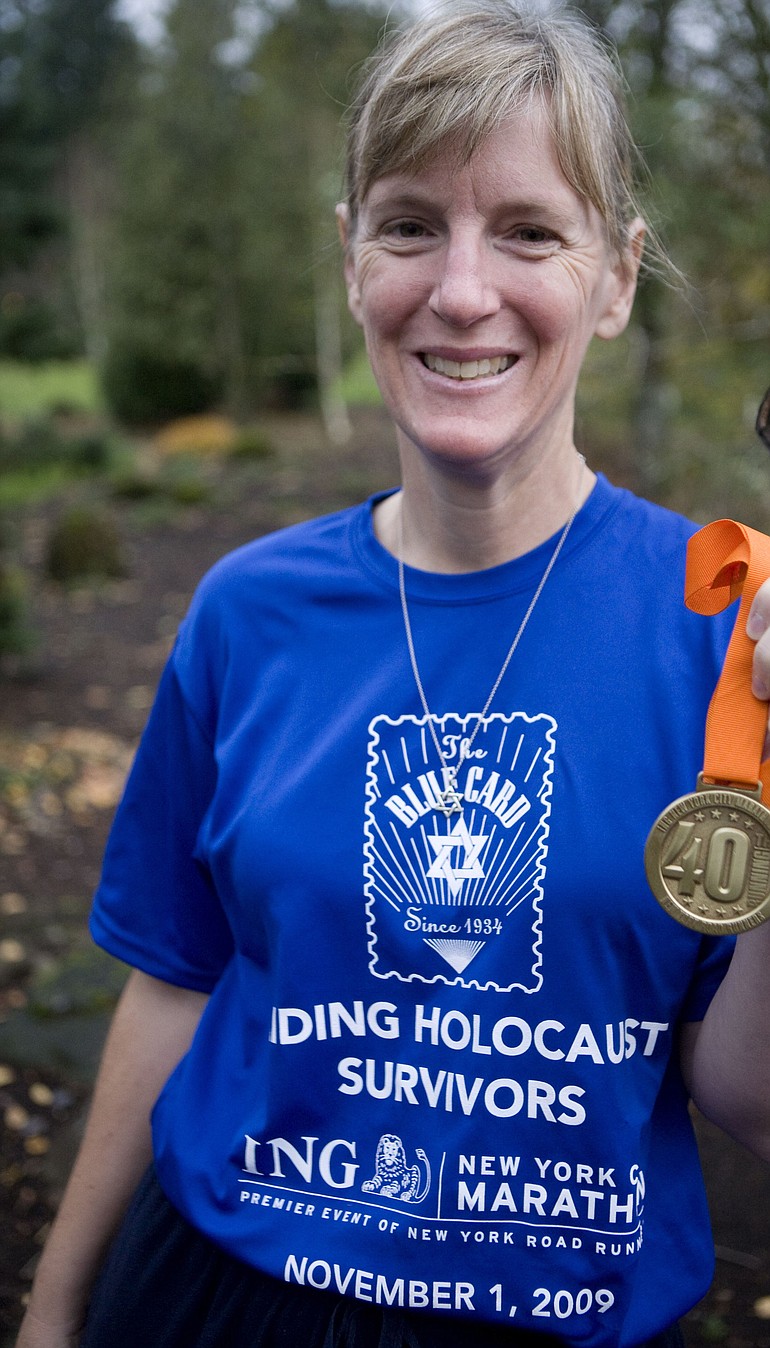Camas runner completes NYC Marathon
The 26-mile journey through the boroughs of New York City on Nov. 1 was the fun part for Michelle Hersh.
The real marathon came in the months leading up to the race, when the Camas woman was organizing a team of 35 runners to race for the cause of Holocaust survivors.
That effort raised $120,000 for The Blue Card, a program that provides aid to Holocaust survivors and their children. Before she joined the mob at the marathon’s start, Hersh received a standing ovation from her teammates during a team gathering.
Before she set foot on the Varrazano-Narrows Bridge, Michelle Hersh put two years of effort into the Blue Card team.
Hersh, who is Jewish, doesn’t know any of the estimated 100,000 Holocaust survivors living in the United States. She first learned of The Blue Card several years ago when her husband, Craig, saw a small advertisement in a Jewish magazine.
When Hersh was considering running the New York City Marathon for charity, The Blue Card seemed a great fit. She contacted the charity, and she applied to the New York Road Runners on behalf of The Blue Card.
Running for charity provides an entry into the NYC Marathon for those who didn’t gain entry through the lottery. By raising at least $2,500 for their charity, runners are granted the opportunity to run.
As satisfying as it was to complete the New York City Marathon on Nov. 1, more satisfying was that day in May when Hersh learned — 18 months after beginning the process — The Blue Card had been selected as a marathon charity.
Elie Rubinstein, the executive director for the New York-based charity, said it was heartening “to see young people who come together who would like to support destitute and forgotten individuals who went through so much.”
As the captain for The Blue Card team, Hersh recruited some of the runners and offered training advice.
By race day, 37 had signed on to run a marathon for Holocaust survivors. Two were sidelined by injury, but the 35 team members who started the race all finished. About half of them were first-time marathoners.
Hersh planned to run alongside some of those teammates, but didn’t connect with them in the sea of humanity at the start.
Instead, she shared the journey with Rebekah Hagan, a 26-year-old from Beaumont, Texas, who she met on the Staten Island Ferry.
“I think it was super-natural that I met Rebekah like that,” Hersh said.
It also made the trek, mostly running but some walking, more enjoyable. But not easy. “A marathon for me is always so challenging. I have to really focus.”
Bands, choirs, and cheering spectators make New York a shared experience. After finishing — in 5 hours and 3 minutes — Hersh walked 20 blocks from Central Park to her hotel, soaking up the “way-to-goes” from passers-by and the sense of accomplishment.
Not only had she completed her eighth marathon, but she had helped shine light upon — and get the word out about — a small New York charity with a big cause.
The day after the marathon, Michelle was a guest at The Blue Card 75th Anniversary benefit. She has since been given an honorary position on the Blue Card board of directors. Hersh continues to serve as the charity’s marathon coach. The Blue Card plans to field teams at several marathons in the coming months. Hersh hopes to run the Los Angeles Marathon in the spring and plans to do NYC again in 2010.
The presence at marathons around the country will help get out the word about The Blue Card. But the marathon in New York City, naturally, will retain a lasting place in Hersh’s heart.
“I just have nothing but respect for the people of New York for putting this together for 47,000 people,” she said.
The same could be said for Hersh’s efforts to bring awareness and aid to thousands of Holocaust survivors in America.
Rubinstein, the charity’s executive, said Hersh’s efforts have had an impact beyond the dollars raised. Holocaust survivors who were unaware of The Blue Card are now getting help.
“It meant so much to us,” he said.





